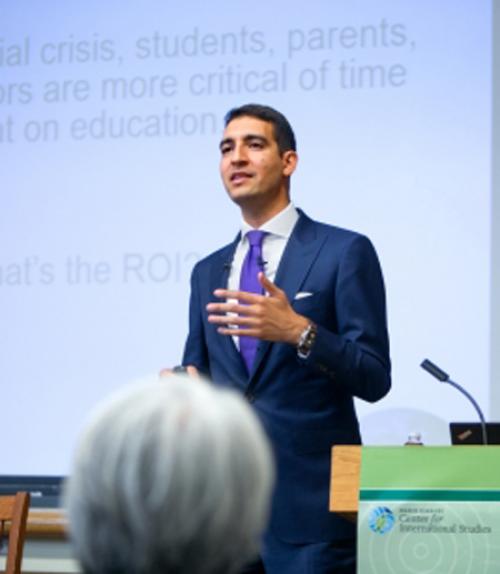Multilingualism and the ability to understand cultures helps in solving global crises such as climate change and military conflicts, said Obama administration official Mohamed Abdel-Kader May 10 as part of the Mario Einaudi Center for International Studies’ Distinguished Speakers Series.
Abdel-Kader, an Egyptian-American who speaks fluent Arabic and basic Spanish, said that although learning a foreign language is often considered a luxury, it is in fact a highly marketable skill in the modern job market.
“When I look at my career trajectory, there were certain flexion points where my language learning or my ability to understand ambiguity in a global context or my ability to understand a global issue really made a huge difference in my career,” said Abdel-Kader. He added that college students should prioritize studying abroad whether through a traditional or virtual experience.
According to Abdel-Kader, although roughly 1 in 5 American jobs are tied to international trade, 90 percent of Americans do not speak a second language. He said English speakers can benefit greatly by being multilingual despite the fact that many global business transactions are conducted in English. He then recalled an exchange with an Arabic speaker who spoke English but was nevertheless comforted to hear Abdel-Kader speak Arabic, adding that multilingualism helps international exchanges feel less “one-sided.”
Abdel-Kader worked for the U.S. Department of Education as deputy assistant secretary in the International and Foreign Language Education Office. He also worked as a development officer for international studies programs at Georgetown University and George Mason University, and said many such programs are under threat.
“Ever since the financial crisis, parents, students and administrators, everybody, is thinking about every single dollar that’s spent,” said Abdel-Kader, calling it “the new landscape” of learning post-financial crisis. He noted that foreign language programs, along with social studies and the arts, are often among the first programs to be cut in K-12 schools. This, he said, is a problem because it prevents students from receiving the language preparation they need to do well in college.
“If our middle schools and high schools are not exposing our students, are not preparing a pipeline for colleges and universities, there’s a disconnect,” he said.
This story also appeared in the Cornell Chronicle.




